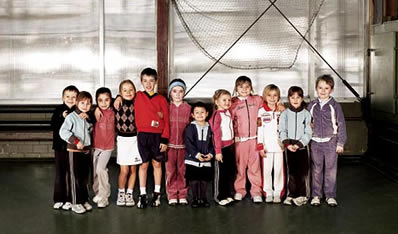How Young Athletes Are Portrayed In The Olympics
I’m actually a big fan of the Olympic Games.
My favorite part is watching the Opening Ceremonies and
seeing the athletes from lesser known countries glow with
child-like enthusiasm as they walk into the Olympic arena.
But every four years, I find myself feeling uncomfortable
with what I am seeing and hearing while watching the Games
on television.
Because I know the sensationalized aspects of the Olympics
are creating more and more confusion and ignorance among
many young athletes, Trainers, Coaches and Parents worldwide.
Believe it or not, I believe that the Olympics are actually
a horrible influence on youth sports.

And while watching the Opening Ceremonies last week,
I got a glimpse of exactly why I feel that way.
“It’s the Struggle, Not the Triumph”
That was the ‘catch phrase’ being repeated by athletes
as they talked into the camera.
And while it sounds good, serves as a wonderful ‘TV sound
bite’ and showcases a majestic feel about the Games
themselves, it sends a very disturbing message to young
athletes and all those who participate in the world of
youth sports….
Hard Work.
Sweat, Blood and Tears.
Effort Conquers All.
And that all sounds good, doesn’t it?
It’s glorifying.
It displays the majestic nature of sport.
And it’s an absolute lie.
Maybe not for elite athletes, but certainly for kids and
teenagers.
The danger is in the fact that most Coaches, Trainers
and Parents think and act like their young athletes are
elite – and end up being influenced by statements like
the one I mentioned above.
“You have to work harder, Johnny”
“If you’re not sore, you’re not working hard enough”
“Did you hear what Micheal Phelps said? You’ll never
get to the Olympics if you don’t push yourself”
What a crock.
With youth sports and young athletes, it really isn’t
about the struggle.
And the destination truly doesn’t matter.
It’s about the journey.
The path.
The process of getting from A – Z.
We actually believe that ‘working kids hard’ every day and
beating the living crap out of them without having a
developmental system in place is the answer.
And it isn’t.
It just isn’t.
In fact, it’s the main culprit for why so many kids are
getting hurt.
Dropping out of sports.
And disengaging from being physical at all.
We just don’t understand the process of what it takes to
become elite.
And that remains our worst and most damaging error when
it comes to working with young athletes.
I hear horror stories everyday about intense training
sessions, over worked young athletes and the general
lack of knowledge that so many Trainers and Coaches have
when it comes to working with this demographic.
And the Olympic Games are making that worse as we speak.
“It’s not the Destination, It’s the Journey”
Words to live by.
Are you prepared to find out what you don’t know and
truly become a leader in the realm of youth sports
training?
Or are you content to just keep plotting along without
a solid direction or path?
I think your young athletes deserve the best.
Why don’t you decide to become the best right now?
The IYCA Level 1 – Youth Fitness Specialist will give you
the tools you need to become a world-class Athletic
Development Specialist.
Maybe it’s time to start your own journey…
Click Here Now and Find Out What You Don’t Know
Brian





